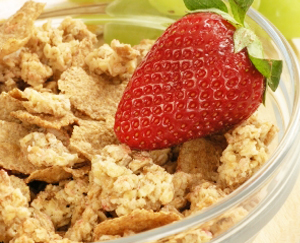Choosing the Right Carbs Can Have Health Benefits

Whole grains have more nutrients, protein, and fiber than refined grains
While carbohydrates are often to blame for weight gain and other unwanted health problems, it’s important to know that they’re not all bad for you. In fact, a new study published in the American Journal of Clinical Nutrition suggests that healthy carbs such as barley can actually improve health by lowering blood sugar (glucose) levels, which may help reduce the risk of type 2 diabetes and heart disease.
Whole grains good for glucose
In this new study, 10 men (average age 21 years) ate an evening meal of white bread or cooked barley kernels. The next morning they were given a glucose drink and had various blood tests including measurement of glucose and insulin levels. Results showed:
- Glucose levels were 29% lower in men who ate the barley compared with men who ate the white bread.
- The men who ate the barley had higher insulin sensitivity (which means their bodies were better able to handle glucose) compared with men who ate the white bread.
- Blood tests that measure inflammation were higher in the men who ate white bread compared with men who ate the barley.
Tips for healthy eating
Carbohydrates are essential for fueling the body and mind with energy. But it is true that some carbohydrates are healthier for you than others. Healthy carbohydrates can improve your health but processed carbohydrates high in sugar and low in fiber can worsen glucose levels and your health. Here are some tips for healthy eating:- Choose healthy carbohydrates. Include a variety of healthy carbohydrates in your daily diet including whole grains, beans, fruits and veggies, and avoid highly processed foods.
- Choose whole rather than refined grains. Whole grains such as barley, brown rice, and whole wheat bread have more nutrients, protein, and fiber than refined grains such as white rice or white bread.
- Limit sugar. Avoid high sugar foods that offer few nutrients. Also limit sweets, processed foods, soft drinks, and other high sugar beverages.
- Choose fruit or veggies for snacks. It may be hard to change habits at first but sticking with it can pay off. Choose fruit or veggies for snacks instead of processed snacks which usually contain high amounts of sugar, fat and/or salt.
- See a doctor. If you already have diabetes or other chronic medical conditions such as heart disease, check with your doctor about a diet that is right for you.
(Am J Clin Nutr 2010;91:90–7)
Jane Hart, MD, board-certified in internal medicine, serves in a variety of professional roles including consultant, journalist, and educator. Dr. Hart, a Clinical Instructor at Case Medical School in Cleveland, Ohio, writes extensively about health and wellness and a variety of other topics for nationally recognized organizations, Web sites, and print publications. Sought out for her expertise in the areas of integrative and preventive medicine, she is frequently quoted by national and local media. Dr. Hart is a professional lecturer for healthcare professionals, consumers, and youth and is a regular corporate speaker.
Copyright © 2026 TraceGains, Inc. All rights reserved.
